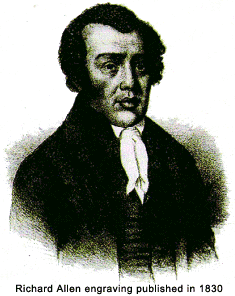 "The love of this world is a heavy weight upon the soul which chains her down and prevents her flight towards heaven. Habitual acts of charity loose her from it by degrees, and help her in her struggle to disengage herself and mount upwards."
The early years
Richard Allen, born a slave in 1760 to a Quaker owner in Philadelphia, Pennsylvania, was sold early in his childhood to a farmer near Dover, Delaware. At the age of 17, Richard joined the Methodist Episcopal Church and began a course of self-education. He became licensed to preach in 1782 and conducted services with his master's permission.
In 1786, Richard purchased freedom for himself and his family, then moved them back to Philadelphia. As he preached to African Americans at St. George Methodist Church, Richard became active in fighting racial discrimination within the church. As a solution, he elected to establish the independent Bethel Church in 1787.
The congregation flourished so much that a new building was needed. In 1794, that building was dedicated by Bishop Francis Asbury, the first Methodist bishop in the new United States. By 1799, Allen had been ordained a deacon, and in 1816, became a bishop in the Methodist Episcopal Church.
A life of activism
The existence of a number of separate black churches in the East offered the opportunity to found a new denomination, the African Methodist Episcopal (AME) Church, also in 1816. Allen was chosen as its first bishop and served there until his death in 1831.
Allen used his church connections to aid the Underground Railroad, as well as rail against the American Colonization Society, which wanted to send black Americans back to Africa. He did, however, assist a movement to relocate some black families to Canada.
Allen was an outspoken critic of slavery and a forceful opponent of any derogation of his race. He was a firm believer in the bright future of black people in the western hemisphere. Allen stood among those black leaders who emerged from the shadow of the Revolution and the War of 1812, to speak and act for themselves — championing the rights and responsibilities of blacks in American society.
A call to charity
His call to charity, as referred to in his autobiography, was a philosophy requiring action to right social wrongs, especially pertaining to his "black brethren." Allen exhorted blacks to demonstrate their capacity for free responsibility, by cultivating the virtues of industry, frugality, and thrift — but acting generously to aid the less fortunate among his people.
Allen's motivating conviction was that black people, though made unequal by the conditions under which they lived, were in no way inferior to other Americans.
"The love of this world is a heavy weight upon the soul which chains her down and prevents her flight towards heaven. Habitual acts of charity loose her from it by degrees, and help her in her struggle to disengage herself and mount upwards."
The early years
Richard Allen, born a slave in 1760 to a Quaker owner in Philadelphia, Pennsylvania, was sold early in his childhood to a farmer near Dover, Delaware. At the age of 17, Richard joined the Methodist Episcopal Church and began a course of self-education. He became licensed to preach in 1782 and conducted services with his master's permission.
In 1786, Richard purchased freedom for himself and his family, then moved them back to Philadelphia. As he preached to African Americans at St. George Methodist Church, Richard became active in fighting racial discrimination within the church. As a solution, he elected to establish the independent Bethel Church in 1787.
The congregation flourished so much that a new building was needed. In 1794, that building was dedicated by Bishop Francis Asbury, the first Methodist bishop in the new United States. By 1799, Allen had been ordained a deacon, and in 1816, became a bishop in the Methodist Episcopal Church.
A life of activism
The existence of a number of separate black churches in the East offered the opportunity to found a new denomination, the African Methodist Episcopal (AME) Church, also in 1816. Allen was chosen as its first bishop and served there until his death in 1831.
Allen used his church connections to aid the Underground Railroad, as well as rail against the American Colonization Society, which wanted to send black Americans back to Africa. He did, however, assist a movement to relocate some black families to Canada.
Allen was an outspoken critic of slavery and a forceful opponent of any derogation of his race. He was a firm believer in the bright future of black people in the western hemisphere. Allen stood among those black leaders who emerged from the shadow of the Revolution and the War of 1812, to speak and act for themselves — championing the rights and responsibilities of blacks in American society.
A call to charity
His call to charity, as referred to in his autobiography, was a philosophy requiring action to right social wrongs, especially pertaining to his "black brethren." Allen exhorted blacks to demonstrate their capacity for free responsibility, by cultivating the virtues of industry, frugality, and thrift — but acting generously to aid the less fortunate among his people.
Allen's motivating conviction was that black people, though made unequal by the conditions under which they lived, were in no way inferior to other Americans.